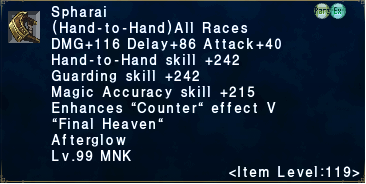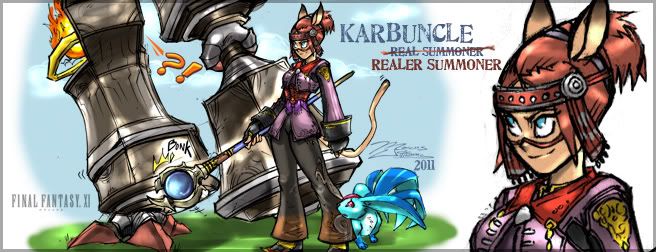That's an interesting system, but I could see it being abused. Assume an alliance of 18 people where several people have 20M+ gil and Meteor or Arise drops. The people who have 20M+ gil try to outbid each other again and again till the final pricetag is 15M for the scroll. The proceeds are then distributed to the alliance (which only means ~882,000 gil to each person). Next time the group goes (assuming the guy who won the scroll even BOTHERS to attend again since why would he need to now?), again the pricetag for Meteor/Arise reaches 15M. Again, it goes to one of the people who have mucho gil. Again, the proceeds are distributed. Rinse, repeat. The people who didn't come to the group with mucho gil have to keep waiting and waiting until the incremental gil they receive from each successive payout finally approaches a threshold level where they can use their prior earnings to bid and win the scroll. (Yes, I am aware they or others can farm in the interim.) This assumes anybody who wins the scrolls actually sticks around, which in a low-accountability group where the "system has no memory" is a high hope at best.
The other proposed system "everyone chooses 1-2 items to freelot" has the same issues when only 2 items are highly desired to begin with, and the event's success depends on the continued attendance of the first few people who won freelots. Imagine how it would fly the first time someone who won an E.Body in that system says to the others "Hay guize, can't make Ein anymoar, I hav a class."
Thread: Provenance Watcher~
-
04-12-2012 07:17 AM #61(1)
Last edited by Mahoro; 04-12-2012 at 01:31 PM.
-
04-12-2012 03:44 PM #62Player


- Join Date
- Mar 2011
- Location
- Windy
- Posts
- 1,429
- Character
- Pimpchan
- World
- Quetzalcoatl
- Main Class
- MNK Lv 99
Lol nope, the guy that gets ebody in your system is also leaving so that's not a disadvantage (and has more reasons to leave in case he wants a second item because then he is at the bottom of the list). You can't force people to keep doing the event regardless of the system. But in the end you will have much less trouble recruiting 1 ppl with "free lot" rather than "point system, you win one point a day and need 100 for your ebody". The gil system is pretty much fail. All you have to do is own an alt char or a mule on which you could farm money (honestly 16+ millions is not much money, I don't see how meteor could sell for less than 50 millions) or even farm money without being in the LS and then pop and buy.
The ideal system for Legion, even though I did not do it yet would be, since all gear but HQ abj are trash :
pick a abjuration type, and free lot on it.
free lot on whatever gear drops.
But to participate you need decent gear aka level 90 empy (for DD, magian staves for mages) and at least full AF3+2.(1)Last edited by MarkovChain; 04-12-2012 at 03:49 PM.

Ultimate DPS simulator
https://docs.google.com/file/d/0B7wbcilaHsTecldhZm94a1gtZnM/edit
-
04-12-2012 10:14 PM #63
The guy that gets E.Body (or Meteor/Arise) in my system doesn't leave the LS once he gets an item because he has multiple goals, and the LS does many more events than just the event that drops E. Body. Every single event he attends (including re-attending the one he just got the E. Body from) gets him closer to another item. You wrongly assume he is at the "bottom of a list" for a second item when he could have already earned enough points for E. Body AND another item simply by attending all the different events, and only been limited by drop rate.
You CAN provide incentives for people to keep doing the event in my system. The best LS's have little attrition. If your theory were true, every person in the history of LS's in this game who ever got an item they wanted would then instantly leave the LS or never set foot into an event they have all the loot from. I don't even have to disprove such an absurd result because anecdotally, you know it not to be true.
The guy that gets E. Body (or Meteor/Arise) in your system has ZERO incentive to stay because if the group only does ONE event, there is literally nothing left for him. You also contemplate recruiting another person with "freelot" to substitute the one who left, but you fail to see how this penalizes the people who remained, and resets their chances at winning the next freelot.... Think harder.
Your statement about all gear in Legion being trash except HQ abjurations is biased since obviously you consider all jobs besides MNK, WHM, and BRD to be trash. So it's a non-starter. I will say it's provably false as there are some superior pieces for other jobs. However, I wish you good luck in clearing Legion with an alliance full of MNK WHM BRDs, and then retaining all 18 people till each person gets the abjurations they wanted.(4)Last edited by Mahoro; 04-12-2012 at 11:54 PM.
-
04-13-2012 12:56 AM #64Player

- Join Date
- Feb 2012
- Posts
- 917
It's an endgame LS, and they do lots of events. If you don't attend events regularly enough, you get kicked from the LS and stop making money and getting the items you want. Quitting events because you got one item you want is going to hurt you in the long run.
You're also forgetting gil distribution for bids on other drops.(1)
04-13-2012 01:16 AM #65One group doing multiple events sounds better to me, sure, but I still query what happens in the scenario I painted where there are inequities in gil and/or outside farming sources. Seems to me that a "gil bidding" system could turn into a continuing game of oneupsmanship where someone would get penalized if they didn't do outside farming and/or the price for ra/ex items becomes vastly inflated because more gil is "entering the system."
(0)
04-19-2012 03:00 AM #66
04-20-2012 12:31 AM #67I envy you. But i also stare at what i can only assume is a shot that anyone who doesn't have their Armor is either
A) Lazy/Unpersistant
B) Not trading cells.
Which is the vibe i get from that post. I can tell you pretty confidently after over 700 Voidwatch runs, 300-400 Of them on 2 NMs specifically, I have a grand total of 1 Body i wanted. Ironically the one i wanted the least, But one I wanted no less. it was the Cure Pot. Body. The ones I'm missing are:
Athos Tabard
Mekira Body
Toci's Harness
Theres also some minor items I've got/want But not worth mentioning. I've also killed the Tier3 Bastok/San/Win "Body" NMs a few times, But most of those were for fun... I was persistent to the point i want to tie 'someone' to a chair, and rip out his teeth 1 by 1, and every time i pull a tooth, I'd tell him "Another LOG!" or "Another Ore!". Because that's what voidwatch became to me, pulling my teeth out.(2)
04-20-2012 02:11 AM #68Yeah, anyone with common sense knows no matter how much persistence you show you're still at the mercy of RNG. I even got my Toci without trading cells, on my first kill.
Yet with constantly trading cells I'm still 0/1xx on Athos gear.(1)Dark Knight ~ 90: Yes I actually use a Scythe.
04-25-2012 11:11 AM #69Player

- Join Date
- Mar 2011
- Location
- MolaMola Enterprises
- Posts
- 115
- Character
- Dew
- World
- Bismarck
- Main Class
- RDM Lv 99
Provenance Watcher drop rate is retarded. Up to 30 kills now and only have seen 2 staffs from the Trove. Provenance Watcher itself hasn't dropped much ether. The drop rate is really low for having to farm so much to get the access, crystals, KIs and then final do the fight. Having to redo all that just to see Red rocks, Petrified logs, and gold ores is dumb. Should at least be a cruor and xp reward or a 100% random abj.
As a final boss, it shouldn't have such a low drop rate. All the requirements to redo the fight already limit how many times you can do it.(4)
04-25-2012 02:09 PM #70Totally agree with you on all counts!! But they just cannot let us have fun, even with the 24 hours limitation, and the 3 KIs that we have to REPEATEDLY get EVERY SINGLE TIME, which is extremely RETARDED.... Those KIs should be permanent and need only to be gotten once. These new contents are highly retarded to be honest. If it is just low drop rates, that's one thing, you get used to it - but all these "invisible hands" to make sure that we cannot progress is ridiculous.
(2)
© SQUARE ENIX
FINAL FANTASY, SQUARE ENIX, and the SQUARE ENIX logo are registered trademarks of Square Enix Holdings Co., Ltd. Vana'diel , Tetra Master, PLAYONLINE, the PLAYONLINE logo, Rise of the Zilart, Chains of Promathia, Treasures of Aht Urhgan, and Wings of the Goddess are registered trademarks of Square Enix Co., Ltd. The rating icon is a registered trademark of the Entertainment Software Association. All other trademarks are the property of their respective owners. Online play requires internet connection.


 Reply With Quote
Reply With Quote
